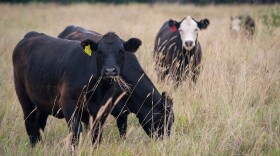-
The region has always been dry, and it’s getting drier.
-
A recent survey shows farm income and borrowing power for crop producers are weak across the Great Plains, but the cattle industry has improved farm finances in some places, including Oklahoma.
-
Ranchers, lawmakers and farmers' unions are sounding the alarm over a Trump administration plan to increase beef imports from Argentina.
-
The beef processing plant in Olathe, Kansas, marked a turning point for Walmart. But ranchers and agricultural experts warn the nation's already stunted beef industry could be falling under more corporate control.
-
Virtual fencing uses GPS collars, sounds and electrical cues to move cattle across a landscape. Along with saving ranchers time, researchers say this new technology can help protect, and create, wildlife habitat.
-
Shoppers are seeing record high beef prices at the grocery store. That's in part because the number of cattle in the U.S. is at an all-time low, while consumer demand has remained strong.
-
Far from the Capitol, students at Texas Tech spend time examining the quality of beef for meat judging competitions.
-
A bill banning lab-grown meat passed the Oklahoma House of Representatives and is on the way to the Oklahoma Senate.
-
As the extreme heat continues across Oklahoma, it not only poses a threat to humans, but also cattle.
-
A highly concentrated beef market has meant higher prices for consumers and lower returns for the people raising the animals. Some ranchers in the Midwest and Great Plains want a new option by organizing their own processing plants.

Play Live Radio
Next Up:
0:00
0:00
Available On Air Stations










